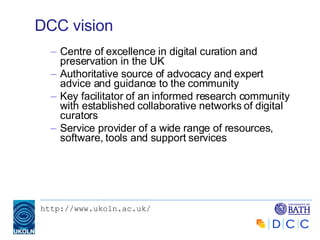Moving OA to the scientific enterprise
- 1. Moving OA to the scientific enterprise Michael Day, Digital Curation Centre UKOLN, University of Bath [email_address] Policy and Technology for e-Science, Institut d’Estudis Catalans, Barcelona, Spain, 16-17 July 2008
- 2. Presentation outline: The Digital Curation Centre (DCC) Some ongoing problems Some new challenges raised by Open Science
- 3. The UK research context (1) Dual-support funding system Splits funding of research from infrastructure Research Councils (around EUR 4 billion pa) Higher education funding bodies Direct institutional support Joint Information Systems Committee (JISC) Data curation on the agenda of several of these Research Councils UK Higher Education Funding Council for England National research data service study JISC
- 4. The UK research context (2) JISC has been very active in funding work on long-term digital preservation and curation: Research projects Over ten years A major recent focus has been on institutional repositories) Supporting studies Dealing with Data (2007) Keeping Research Data Safe (2008) Studies of 'significant properties' of certain classes of content (ongoing) The Digital Curation Centre (DCC)
- 5. The Digital Curation Centre (DCC) Launched in 2004 Initial grant funding from: Joint Information Systems Committee (JISC) UK e-Science Core Programme (Engineering and Physical Sciences Research Council) Main activities: Development, services and outreach in digital curation Research programme (2004-2008) Consortium of four institutions Now in second phase
- 6. Curation, not just preservation Active management of data over life-cycle of scholarly and scientific interest Reproducibility and reuse Appreciation of differences between disciplines Explored in separate DCC SCARP project Big-science / small-science distinctions are becoming blurred Importance of lifecycles Conception, creation, use, re-use Curation potentially involves a lifetime of endeavour
- 7. DCC Curation Lifecycle Model
- 8. DCC vision Centre of excellence in digital curation and preservation in the UK Authoritative source of advocacy and expert advice and guidance to the community Key facilitator of an informed research community with established collaborative networks of digital curators Service provider of a wide range of resources, software, tools and support services
- 9. Selected DCC activities and outputs User services Curation Lifecycle Model Curation manual and briefing papers Tools for repository self-assessment (DRAMBORA) Community Development Website, journal (IJDC) Events (regular workshops/training, annual international conference) Liaison with JISC's repositories activities Tools and infrastructure Representation Information registries
- 10. Problem 1: who 'owns' curation? Many potential stakeholders Dealing with Data report (2007) identified: scientists, institutions, data centres, the users of data, funding bodies and publishers Also ... data scientists, curation specialists Different repository types (project-specific, community-driven, reference collections) The potential for duplication of effort and confusion is high All of these probably have some kind of role ... so how do we co-ordinate?
- 11. Problem 2: institutions v disciplines A major focus in UK is on the institutional role in curation: Building on the Institutional Repository paradigm It is not clear, however, that the curation of data is best performed at this level Keeping Research Data Safe (2008) report notes that data is more often dealt with by discipline-based consortia Bottom-up approaches to curation work well in some domains – but not in all Need to understand domain differences Initial SCARP studies reveal much complexity
- 12. Problem 3: how much will it cost? Keeping Research Data Safe (2008): Report (with case studies) focused on identifying costs at the institutional level Some findings: The complex service requirements for curating research data means that institutions are setting-up federated approaches to repository development Currently ingest costs are much higher than long-term storage and preservation costs Start-up (and R&D) costs are high for first adopters
- 13. What is needed for open science? Some challenges: 1. Being open is not enough Data need to be made available in ways that facilitate high-throughput reuse e.g., Peter Murray-Rust's comments on the amount of chemistry data captured in formats like PDF 2. How do we capture the context(s) of research? Not just papers and data, but Web-sites, annotation services, blogs, wikis, etc. Importance of recording provenance
- 14. What is needed for open science? 3. Current scientific reward structures do not support either data curation or open science Funding bodies can 'mandate' (and in some cases fund) Principal Investigators to maintain data and make it available Without a sustainable infrastructure, however, this will be only a short term solution We need to decide what infrastructure we need and how we pay for it
- 15. What is needed for open science? 4. What will be the role of institutions? They have traditionally had an important role (e.g., research libraries) Currently are major supporters (and hosts) of Institutional Repositories Potential skills gap WRT data: We need to think about the status and skills of data curators (capacity building) DCC Curation 101, DigCCurr project What does the 'institution' mean in Open Science anyway? Open Notebook Science, open grant proposals, loyalty to collaborators or to institution
- 16. Summing up There are still many more questions than answers There is a (widely acknowledged) need for better co-ordination: The curation landscape is currently very fragmented, with no real clarity with regard to identifying (and owning) roles and responsibilities Much is specific to particular domains There is a need for infrastructure But what should this include? Are we really able to identify generic needs?
- 17. Acknowledgements The Digital Curation Centre is funded by the JISC and the UK Research Councils' e-Science Core Programme. http://www.dcc.ac.uk/ UKOLN is funded by the Museums, Libraries and Archives Council, the Joint Information Systems Committee (JISC) of the UK higher and further education funding councils, as well as by project funding from the JISC, the European Union, and other sources. UKOLN also receives support from the University of Bath, where it is based. http://www.ukoln.ac.uk/

![Moving OA to the scientific enterprise Michael Day, Digital Curation Centre UKOLN, University of Bath [email_address] Policy and Technology for e-Science, Institut d’Estudis Catalans, Barcelona, Spain, 16-17 July 2008](https://image.slidesharecdn.com/dayesof03-1217267144918710-9/85/Moving-OA-to-the-scientific-enterprise-1-320.jpg)















